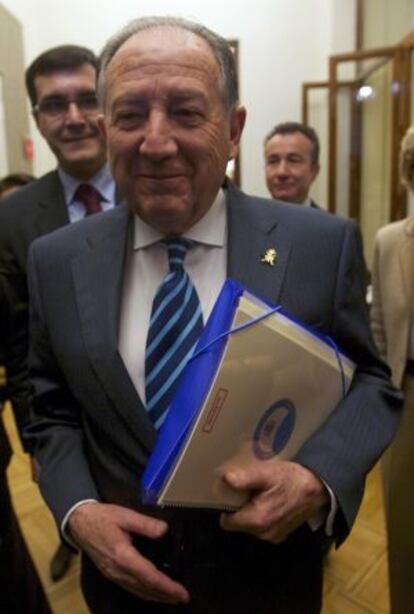Spy chief accuses Catalonia of trying to identify overseas agents
CNI director admits using services of hacker but denies that king’s friend Sayn-Wittgenstein played any secret service role

The director of the Spanish CNI secret service, Félix Sanz Roldán, has accused the Catalan regional government of attempting to find out where its agents are stationed abroad through its foreign service DiploCat. The spy chief did not go so far as to suggest that the intention was to reveal the identity of individual agents — which would constitute a crime of revealing state secrets — but instead that it was an attempt to discover the number and deployment of Spain’s secret service assets overseas.
Josep Antoni Duran Lleida, spokesman for the governing CiU coalition, said at a meeting of the Congressional Reserved Funds Committee that the number of agents in Catalonia had also increased in response to the secessionist policies of regional premier Artur Mas. Sanz denied the CNI presence had risen and said there are around 70 agents in the region — fewer than at other times — dedicated to anti-terrorism operations.
Sanz was also grilled by deputies over the political espionage scandal in Catalonia, which has led to official accusations from the leader of the regional Popular Party, Alicia Sánchez-Camacho. Sanz replied that the CNI had never contracted Método 3, the private detective agency alleged to have spied on Sánchez-Camacho, although its former director, Francisco Marco, had tried to gain an audience with both Sanz and his predecessor.
The CNI chief surprised the deputies by saying that he was aware of 169 Método 3 investigations, their titles and who ordered them, although he stated it was “open information” and accessible on the internet.
Sanz admitted that the CNI had contracted the services of the hacker Matías Bevilacqua, whose CFLabs company was shut down by the police last year after it emerged it was stealing personal information and selling it to third parties. Among items seized from Bevilacqua during the operation was a pen drive full of information relating to the Nóos embezzlement case engulfing Spain’s royal family.
Sanz noted that the CNI had used Bevilacqua’s services between 2000 and 2008 purely for forensic information unavailable from other sources. In a gesture of transparency, Sanz showed deputies the contracts.
The CNI chief also stated that Corinna zu Sayn-Wittgenstein, a personal friend of King Juan Carlos and a German aristocrat by marriage, has never worked for the agency in any capacity, and that the CNI has never investigated her. Sanz also denied Sayn-Wittgenstein had received a CNI bodyguard during her visits to Spain and played a straight bat when asked if she had stayed at residences belonging to the National Heritage. “I only know she has never been resident in Spain,” Sanz responded to questions from United Left coordinator Cayo Lara.
Tu suscripción se está usando en otro dispositivo
¿Quieres añadir otro usuario a tu suscripción?
Si continúas leyendo en este dispositivo, no se podrá leer en el otro.
FlechaTu suscripción se está usando en otro dispositivo y solo puedes acceder a EL PAÍS desde un dispositivo a la vez.
Si quieres compartir tu cuenta, cambia tu suscripción a la modalidad Premium, así podrás añadir otro usuario. Cada uno accederá con su propia cuenta de email, lo que os permitirá personalizar vuestra experiencia en EL PAÍS.
¿Tienes una suscripción de empresa? Accede aquí para contratar más cuentas.
En el caso de no saber quién está usando tu cuenta, te recomendamos cambiar tu contraseña aquí.
Si decides continuar compartiendo tu cuenta, este mensaje se mostrará en tu dispositivo y en el de la otra persona que está usando tu cuenta de forma indefinida, afectando a tu experiencia de lectura. Puedes consultar aquí los términos y condiciones de la suscripción digital.









































